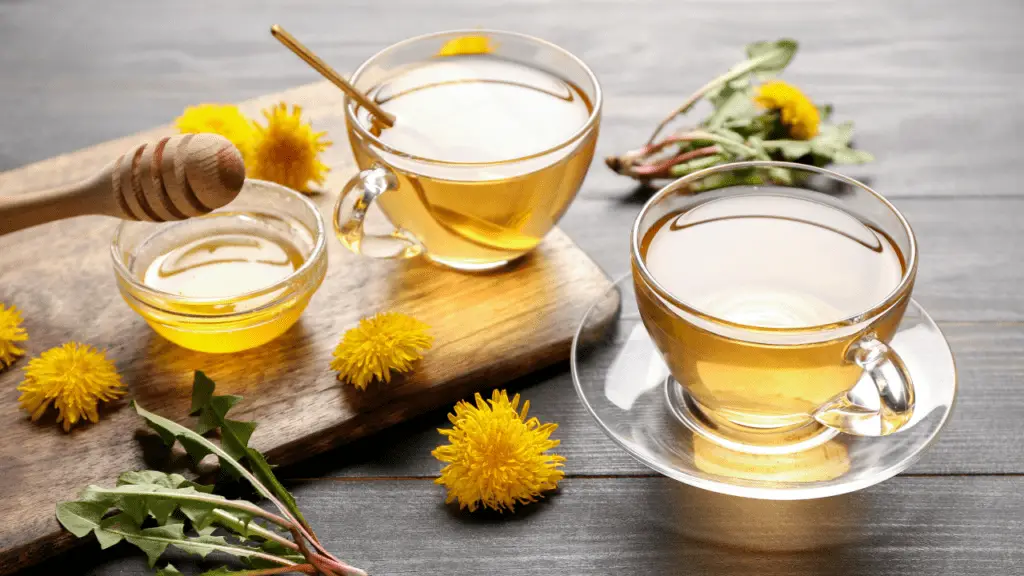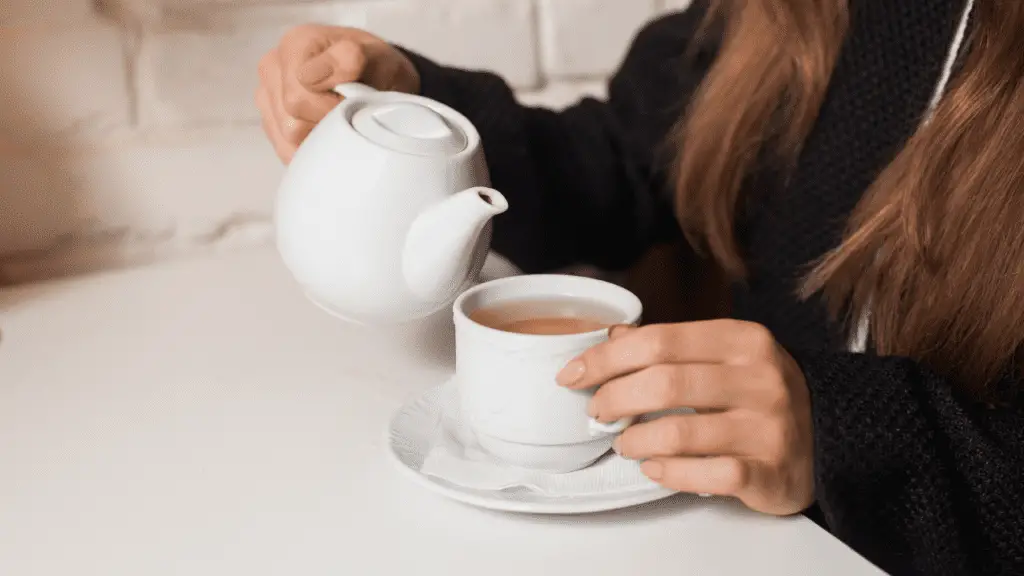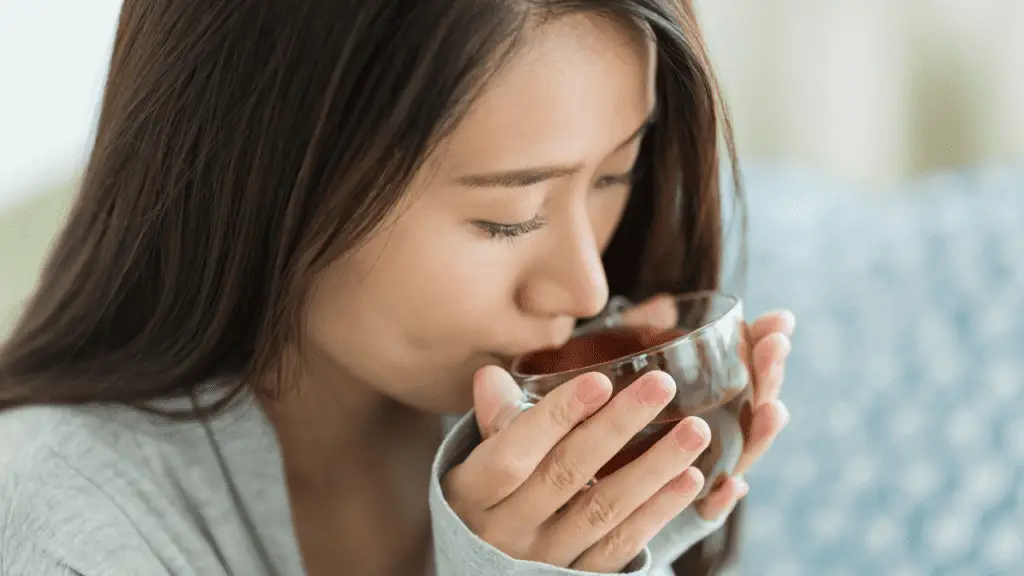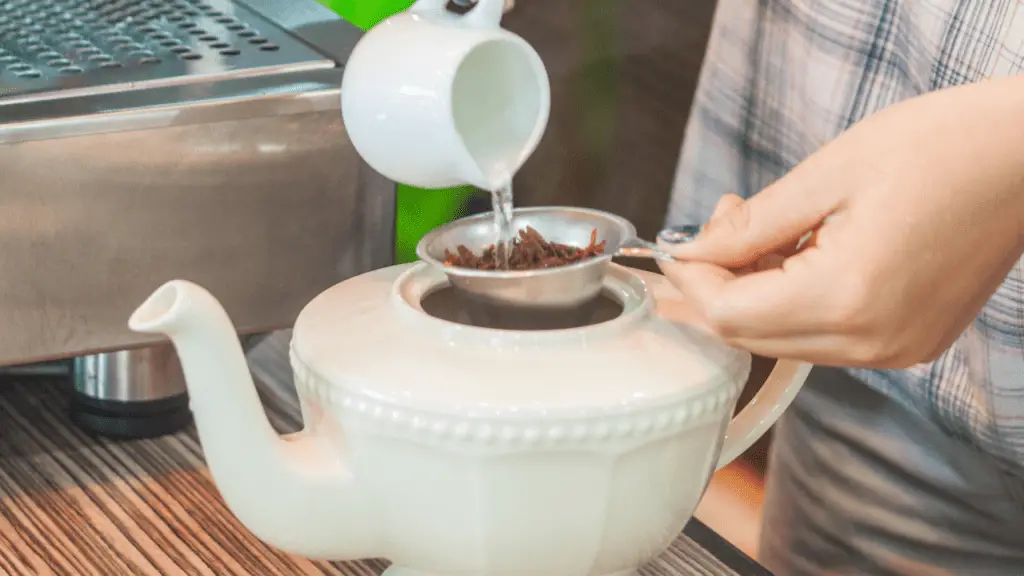Many of us are already accustomed to grabbing a coffee to start our day. Or you are even drinking coffee or sugary drinks for an energy boost throughout the day.
The idea sounds great, but why not drink something that your body will thank you for? There are more reasons than just one for adding dandelion tea to your routine.
Never heard of it before or don't know much about it? Not to worry, we've got you covered with everything you need to know.
What is Dandelion Tea?
Did you think of a dandelion as a weed growing in your backyard? Well, the roots, and sometimes the leaves and flowers, of this “weed” can be used to make a delicious infusion. This infusion is called dandelion tea. Depending upon the part of the plant, there are three basic types of dandelion tea.

The tea has a characteristic robust taste with astringent notes. The dandelion root tea has the same taste as coffee so you can use it as a caffeine-free coffee substitute. You will get a sweet, delicious taste if you make the tea with the flowers.
Health Benefits of Dandelion Tea
Now that we're familiar with dandelion tea, let's talk about the advantageous effects of dandelion tea on our physical health:
Lowers blood sugar:
Type 2 diabetes is one of the most common and deadliest diseases nowadays. Hence, it is paramount for patients to take every measure possible to keep this disease under control.
And here is where dandelion tea comes into our discussion. This fantastic brew has a knack for reducing blood sugar levels and keeping them in check. Moreover, it also improves insulin tolerance.
Possesses excellent diuretic properties:
Although not as deadly as diabetes, bloating is a reasonably disturbing health condition and can cause several complications. The best strategy to deal with this ailment is flushing the entire system.
One way to do so is by frequent urination. Dandelion tea is an excellent diuretic, a substance that promotes and increases urination. Hence, having a cup of dandelion tea can go a long way in recovering from bloating.
A great source of antioxidants:
Antioxidants are a group of chemical compounds that are highly beneficial for our bodies. Antioxidants actively neutralize free radicals, deal with oxidative stress, and prevent cellular damage.

Having a diet rich in antioxidants prevents the onset of several diseases and delays aging. Dandelion tea is an excellent source of antioxidants, so drinking it daily can significantly improve your overall health.
Cleanses liver and blood:
Remember the diuretic property of dandelion tea that we talked about? Because of that property, dandelion tea also works wonders on the liver and blood. Sipping dandelion tea daily drives away toxins from your liver and blood. Eventually, it reduces the risk of liver complications by keeping the liver healthy and functional.
Helps in weight loss:
According to a statistic, the obesity rate of adults in the US has risen to a whopping 35 percent. If you're also battling obesity and are looking for ways to deal with it, look no further than dandelion tea.
If you compare dandelion tea with a weight loss drug, the former has the same potency. And the fact that dandelion tea is made from a natural herb makes it an excellent candidate. Hence, talk to your nutritionist about adding dandelion tea to your weight-loss regime.
Relief from urinary tract infections:
Try drinking dandelion tea if you suffer from any urinary tract infection and can't find relief. Not only will you notice your symptoms getting better, but you will also satisfy your palate by drinking this brew—dandelion tea battles urinary tract infections from two fronts.

Firstly, the antioxidants in the tea possess anti-inflammatory properties. Secondly, the diuretic nature of the drink also plays its part in providing relief.
Regulates blood pressure:
Who knew that the secret behind well-maintained blood pressure was drinking a mug of steaming dandelion tea daily? Among other active bio compounds, the brew is a rich source of potassium.
Being an exceptional electrolyte, potassium filters toxins from the blood and promotes their excretion via the kidneys. As a result, the blood flow becomes significantly better, which, in turn, regulates blood pressure.
Lowers cholesterol:
Taking charge of your blood cholesterol and reducing its levels is a New Year's resolution for numerous heart patients. A high cholesterol level puts you at a greater risk of cardiovascular disorders if you're not suffering from any. For this reason, doctors and medical experts advise drinking a cup of dandelion tea daily to lower your cholesterol levels.
Bolsters the immune system:
The robust root of dandelion is well known for its antiviral and antimicrobial properties in the medicinal world. Many people have an immune system that could benefit from a daily cup of dandelion tea.

The brew manages a fantastic job of warding off an army of viruses or swathes of harmful bacteria. With COVID still looming around the corner, dandelion tea can be a significant weapon in your arsenal to fight it.
Quick recovery from flu:
Your body craves something warm and cozy whenever down with the flu and sore throat. Why not sip a hot mug of dandelion tea instead of any ordinary tea or coffee in such a scenario? The former also gives you the extra benefit of cutting down the flu time without any side effects.
Improves gut health:
Doctors and medical experts were left in awe when they realized dandelion tea's wonders on your gut. This ancient folk remedy does everything right to soothe your stomach lining and regulate bile flow. Additionally, dandelion tea helps your gut absorb essential minerals and vitamins and promotes gut flora.
Has an excellent nutrition value:
Dandelion tea isn't just a drink that satisfies your palate with its delicate sweet taste. The tea is packed with essential minerals and vitamins to boost your physical health significantly.
The vitamin A and C content of dandelion tea is highly notable. These vitamins boost the immune system, delay premature aging, and promote healthy cell growth. Dandelions are also a great source of calcium, potassium, and magnesium.
Promotes skin health:
Dandelion tea knows its way around skin conditions and how to protect you from them. Dandelion spurs collagen production, reduces inflammation, and keeps your skin hydrated.
All these effects ensure fresh, healthy skin and make you look young. Moreover, this beverage also protects the skin from the sun's harmful radiation.
Lowers the potential risk of cancer:
Although there isn't any cure for cancer yet, doctors and healthcare providers have taken several preventive measures. Dandelion tea is a dietary item that proactively reduces the potential risk of developing cancer.

The dandelion in the tea is responsible for initiating the death of cancer cells. For this reason, dandelion tea should be an indispensable part of your diet.
Who Shouldn't Take Dandelion Tea?
There are certain health conditions where using dandelion or taking dandelion tea becomes a severe risk.
For instance, doctors do not advise drinking dandelion tea to someone allergic to plants such as daisies, chrysanthemum, and marigolds. More specifically, someone with eczema should avoid dandelion tea.
Similarly, there is not enough research to conclude whether dandelion tea is safe for newborn or unborn babies. To be safe, maintain a safe distance from dandelion tea if you're pregnant or are breastfeeding a baby.
Remember how we discussed that dandelion tea is an excellent diuretic? If you're already taking a “water pill,” then dandelion tea can amplify its effect and cause significant inconvenience.
In addition, dandelion tea should not be taken together with heart medication or blood-thinning herbal or medicinal supplements. Hence, people suffering from cardiovascular issues should stay as far from dandelion tea as possible.

Most health care providers believe that drinking dandelion tea while taking sedatives, antibiotics, or lithium can prove harmful to the patient. Antacids and medicines used to treat diabetes also interact with dandelion tea. Even some vitamins can cause a reaction when coupled with dandelion tea.
Hence, before you consider adding dandelion tea to your daily regimen, consult your medical expert if you take any medication.
How Much Dandelion Tea is Safe to Drink?
Some people can down as many as four mugs of steaming dandelion tea each day. On the other hand, others can experience difficulty digesting even a single cup. Doctors and nutritionists lack adequate, reliable information to recommend a fixed appropriate dosage.
Hence, the best option is to consult your healthcare provider. While discussing whether the tea will interact with your current prescriptions, you can also discuss a safe daily dosage.
But, generally, it is safe to drink dandelion tea daily if you don't take any medication that interacts with it.
When to Avoid Drinking Dandelion Tea
Drinking dandelion tea is acceptable any time of the day, but scheduling your cup of tea can have several benefits.
The diuretic property of dandelion tea has several implications. If you take it right before going to bed, you'll have to visit the bathroom several times during the night. To save yourself from this inconvenience, it is recommended to sip this flavorsome brew well before bedtime.

Be cautious of drinking your dandelion tea if you take supplements. Medical experts suggest that you should have your mug of refreshing dandelion tea an hour after taking your daily supplements. Doing so negates the drink's potential risk, reducing your supplement's potency.
Other than these two instances, you are free to drink any time that suits you.
Are Dandelion Tea and Chamomile Tea the Same?
Some people confuse dandelion and chamomile. Both have a few similarities, but they are not the same.
Dandelion and chamomile both belong to the same family of plants called Asteraceae. Naturally, two different species of plants belonging to the same family have several similarities.
Dandelion and chamomile have numerous health benefits. Hence brewing a cup of their tea and drinking it can prove highly beneficial for health. Moreover, both have zero caffeine, so that you can drink both daily.

But, in reality, both are pretty different from each other. Dandelion tea is usually made from the roots of dandelion and very rarely from the leaves or flowers. To make chamomile tea, you require chamomile flowers.
Chamomile tea helps relieve emotional stress and induces a sense of calm. For this purpose, the drink can be used as a late-night sedative to help yourself drift into a deep, peaceful sleep.
Furthermore, it is not advised to drink dandelion tea before sleep. As discussed, it can lead to frequent urination and ruin your rest. Although both teas contribute to better physical health, they have different health benefits. Both have a unique, characteristic taste and appearance as well.
Recipe for Making Dandelion Tea

After realizing the multitude of health benefits of dandelion tea, you might be excited about trying this delicious drink. If that is the case, here is an easy recipe to make dandelion tea from the roots of the plant:
Obtain the roots:
- If you have grown dandelions in your garden, use a dandelion fork or a spade to dig up the plant.
- Separate the long wiry taproots from the stem and leaves.
- Rinse the roots well using cold water at high pressure.
- Once the roots are fresh and clean, cut them into small parts using a sharp knife.
- Make sure you manage to get at least two tablespoons of dandelion roots.
Roast the roots:
- Preheat your oven to 200° Fahrenheit.
- Then, line a baking pan with parchment paper, and place the roots you have obtained on it.
- Let the roots roast in the oven for about 2-3 hours. Once roasted, you can also grind the roots in a coffee grinder, but this step is optional.
Some helpful tips:
Keep rotating the roots so that they don't burn. To check whether the roots are done, apply force. If they snap and break in half, they are ready. If they are flexible and bend instead of breaking, they need more time in the oven.
OR
- Roast the roots in the pan on medium-high heat on the stovetop. Stir often to avoid burning the roots.
- Use cast iron pans as they impart a rich, smoky flavor. Once the roots become dark brown, they are ready to be taken out.
Next Step:
- Heat water and add the roots:
- Pour 1 cup of filtered water into a saucepan and let it boil at 140° Fahrenheit.
- Add 2 tablespoons of the dried, roasted roots and let it steep for 3-4 minutes.
- Next, turn off the burner and let the mixture simmer for 20-30 minutes.
Strain and serve:
- Take a fine-mesh strainer to strain the mixture into a cup.
- You can add honey if you like a sweeter taste or serve as-is.
- Your tea is finally ready. Enjoy!

Final Thoughts
We're sure you are excited about trying dandelion tea. Considering the bountiful benefits, it might do your body good, too. Always make sure to consult a doctor regarding potential risks or allergies.
Lastly, it is best to drink your cup of goodness earlier in the day so that it doesn't affect your sleep due to being a diuretic.






